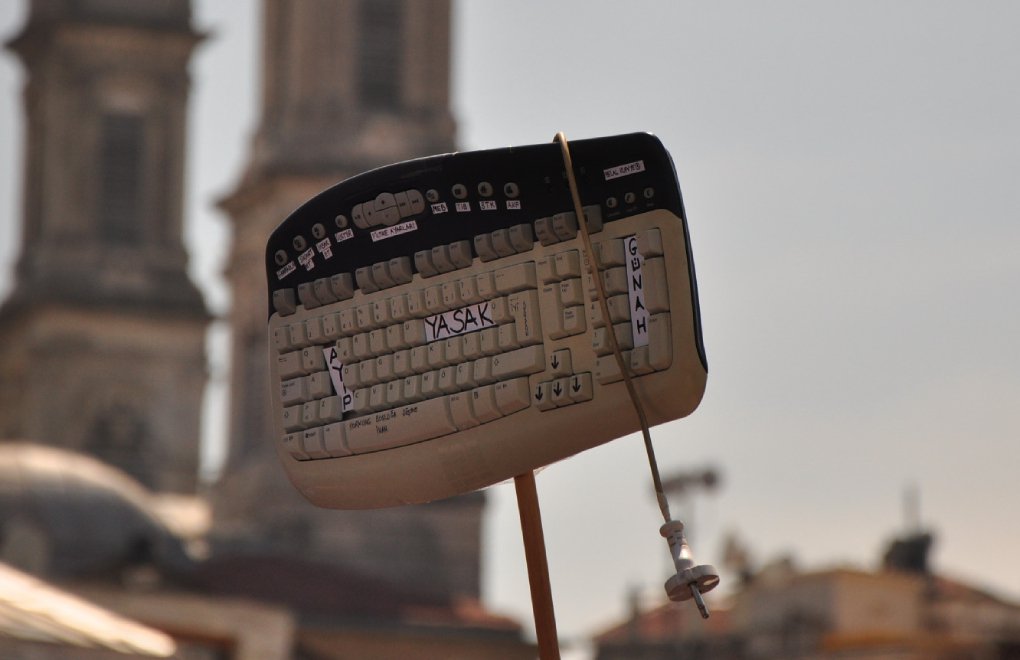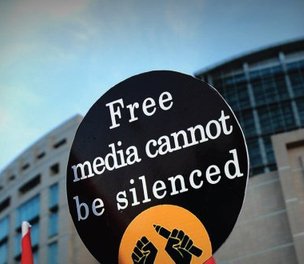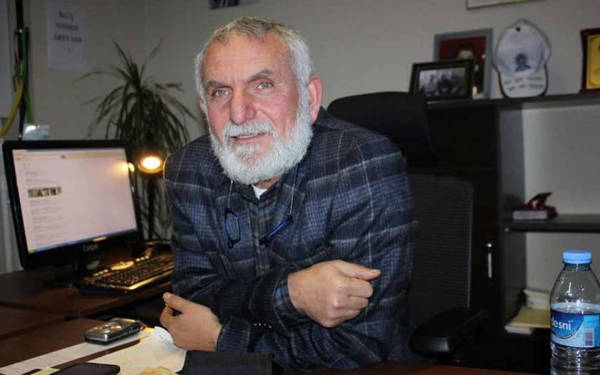A photo from the "Don't touch my internet" protests. (Credit: erhanekici.com)
Click to read the article in Turkish
Freedom House, a US-based think tank, has released its annual "Freedom on the Net" report, which includes Turkey in the category of "not free" countries.
Turkey's internet freedom score stands at 34 out of 100 with 15 points in "obstacles to access," 10 points in "limits on content" and 9 points in "violations of user rights," according to the report.
Internet freedom continued to decline for a third year in a row in Turkey, the report shows. It scored 25 points in 2020 and 37 points in 2019.
In the report covering between June 1, 2020 and May 31, 2021, Freedom House notes that access to hundreds of websites were blocked in Turkey and content critical of President Recep Tayyip Erdoğan were removed from platforms.
It said activists, journalists and social media users were subjected to physical and online harassment because of their posts on social media.
Aloso mentioning the detention of Boğaziçi University protesters because of using Clubhouse app, the report says, "Criminal cases were carried out against those who posted undesirable commentary on social media, and the threat of online surveillance, harassment, and criminal penalties has contributed to the growing practice of self-censorship among internet users in Turkey. The proliferation of restrictive laws has further formalized censorship in the country."
"Turkey is losing points every year"
Gürkan Özturan, the Media Freedom Rapid Response Coordinator at the European Centre for Press & Media Freedom (ECPMF), which prepared the report's Turkey section, told bianet that online freedom is declining in both Turkey and across the world.
"When we look at the report, it is possible to see the increasing digital repression in the last 10 years. This report shows that freedom is declining not only in Turkey, but also around the world.
"However, it is remarkable that Turkey, as one of the fastest-growing countries in this recession, cannot get out of the list of 'not free countries' by losing points from year to year.
"New or increased taxes, restrictions on access, deleted news content, the ability to close access to entire platforms, and most importantly, the detention or arrest of people who exercise their freedom of expression due to their critical statements on the internet, and the conviction of some of them, shows that there is a long way to go in terms of internet freedoms in Turkey."
Polarization
"In the 2020-2021 period, the developments that came to the fore were the social media-based legal proceedings against dissident political figures, marking critical journalists as a target and violent attacks on them, the practices that students were subjected to after expressing their demand for academic freedom and a democratic campus," said Özturan.
The social media law, which was enacted in July 2020 and the new obstacles that it put on the public's access to information and freedom of expression, was also among the important developments, he added.
"Unfortunately, it's not possible to see anything beyond polarization ... when we look at the political side of the field of internet freedoms," he said.
From the report>> Internet speeds continue to be reliable in Turkey. According to Speedtest, Turkey ranked 53rd globally for mobile speeds, and 99th for broadband speeds in June 2021. >> Internet pricing in Turkey remains high due to the market concentration in broadband services that have led to high costs, despite low wages and high inflation. Internet pricing in Turkey remains high due to the market concentration in broadband services that have led to high costs, despite low wages and high inflation. >> According to the 2020 Inclusive Internet Index Report, 13 percent more men than women access the internet, which shows a 2 percent improvement from the previous year. However, there is no apparent gender gap in mobile phone access. >> Turkey's telecommunications infrastructure did not successfully deploy online learning during the pandemic. The six gigabytes (GB) of internet connection made available for teachers was inadequate for online classes; 1.5 million students lacked internet connection. >> Frequent power shortages continued to be experienced country-wide, though not as severely as during previous reporting periods. In past years, connectivity in the southeastern region was negatively affected by poor telecommunications infrastructure and electricity blackouts. >> Several regulatory and economic obstacles limit the diversity of service providers. Though all legal entities are allowed to operate an ISP, there are some requirements to apply for authorization pertaining the company's legal status, scope of activity, and shareholders' qualifications. Informal obstacles may also prevent newly founded companies without political ties or economic clout from entering the market. >> Blocking of online content, particularly news and citizen journalism, has increased in recent years. >> In addition to widespread filtering, state authorities are proactive in requesting the deletion or removal of content. >> Websites can be blocked for "obscenity"—which in the past included any site with keywords relating to sex or sexuality in the domain name—or if they are deemed defamatory to Islam, which includes content that promotes atheism >> Digital media outlets are inhibited by heightened self-censorship. The many prosecutions for defaming the president have had a chilling effect on social media users in recent years (see C3). Self-censorship online has also been exacerbated by decrees passed under the 2016 state of emergency that expanded the government's surveillance powers. |
(HA/VK)











